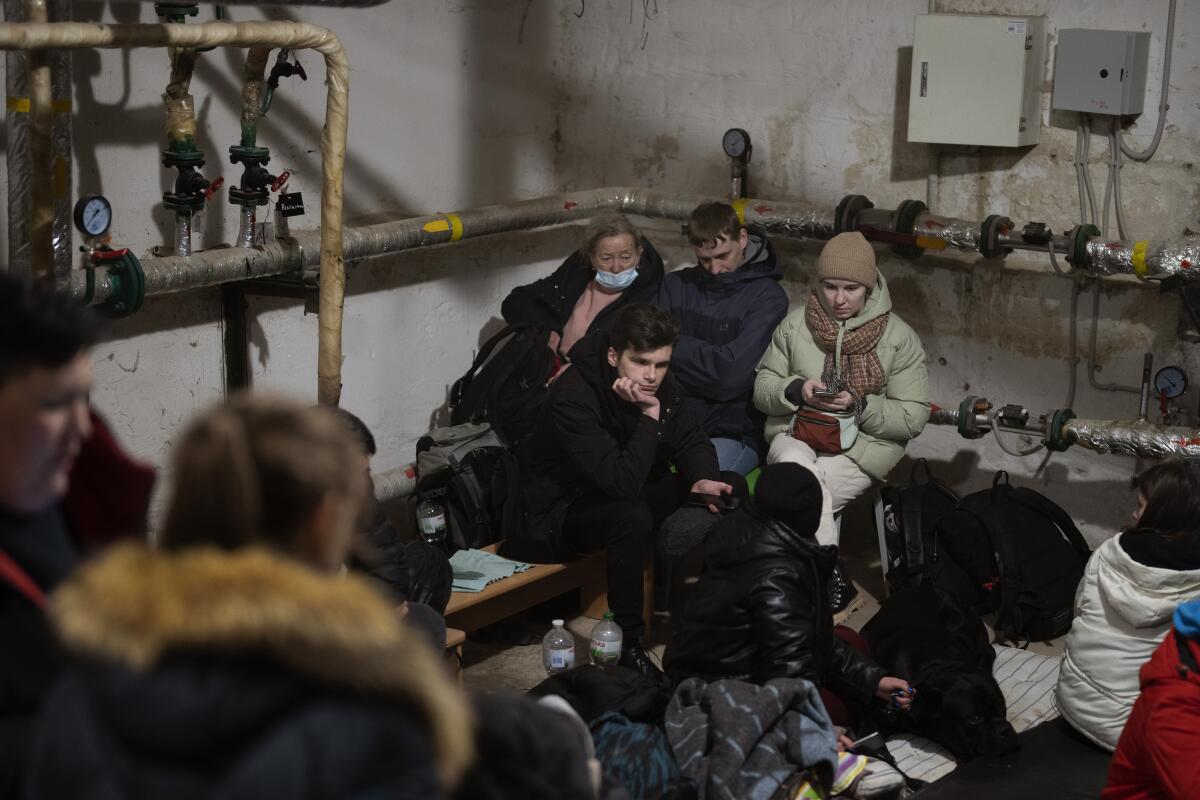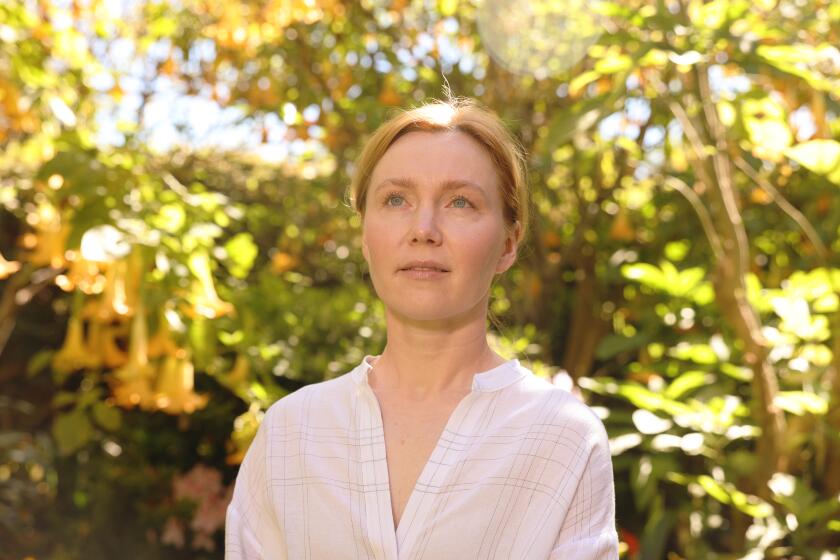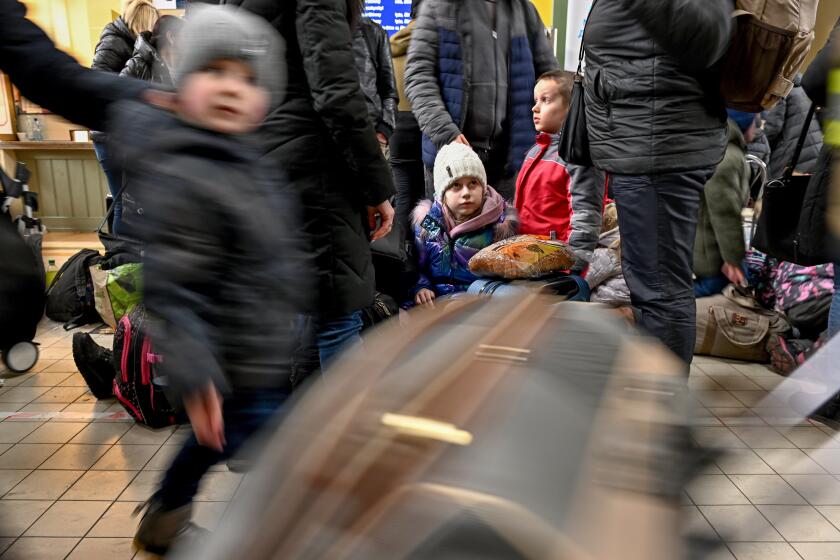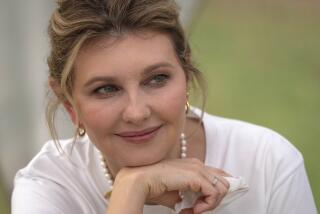Op-Ed: Why the images out of Ukraine bring back memories that shake me to the core

In the overwhelming tsunami of photographs from the war in Ukraine, I find two especially riveting. One shows people bundled up and sitting idly in the basement of an apartment house in Kyiv as airstrikes and street warfare rage outside. The other frames a soldier’s body, splayed on the ground under a light layer of snow near a troop carrier destroyed by Ukrainian defenders.
These images arouse a deep, visceral shudder in me. They transport me to a remote cavern in my consciousness, one I seldom visit. The cavern hides memories of the anti-Soviet Hungarian Revolution of October-November 1956, when I was a boy of 7 living in Budapest. The scenes I recall from that time are painful.
I’m huddling in the basement of my family’s apartment house near the Danube River as air raid sirens wail outside. I’m seeing the worried looks on the faces of my parents and neighbors in the gloom of the chilly basement as the earth shakes and lights flicker. I’m looking out from our apartment balcony at smoke rising from the Hungarian Parliament building.
Members of California’s Russian diaspora have found themselves thrust into the center of the Ukraine war thousands of miles away.
I’m watching Soviet tanks marked with red stars rumbling down neighborhood streets. I’m hurriedly passing Hungarian freedom fighters whose dead bodies lie uncovered in snowy gutters. I’m seeing the sudden proliferation of Hungarian flags with a large hole in the middle where the Communist hammer, stalk of wheat and red star have been defiantly cut out.
Why do the photos of Ukraine bring back these usually shrouded memories in a way that shakes me to the core? I have seen more gruesome images from Vietnamese jungles, Middle Eastern deserts, Nigerian villages. Maybe it is because of the similarities between Hungary 1956 and Ukraine 2022. Russian firepower is aimed at a weak neighboring nation. Mind-numbing doublespeak is heard from a raging dictator. Democratic aspirations are crushed through brutal suppression and murder.
More likely, though, my soul shudders because those photos evoke my childhood memories from the revolution I lived through — and the feelings that still accompany them. I recall the palpable fear I felt in that basement, the terror that we might be harmed, the dread of what tomorrow might bring. Memories emerge of the hurried, hushed discussions about whether my family should try to escape from behind the Iron Curtain. I didn’t understand those discussions then, but I grasped their import from the desperate tone of the adults. I recall packing my tiny teddy bear, and it makes me aware that countless Ukrainian children are confronting similar fearsome events, packing their “lovies” and having their worlds ripped out from under them.
My parents made the fateful choice to become refugees, as 2 million Ukrainians already have since the Russian invasion. Half of the refugees are children. Their lives will be affected in the many ways that mine was.
All these years later, I am grateful that my parents chose to escape the Hungarian prison-state, along with 200,000 other Hungarians. Some of them, like my parents, were Jews who had barely survived the Holocaust just a decade before. We were fortunate to be among the 35,000 Hungarian refugees whom America welcomed.
The outpouring of support from Ukraine’s neighbors could grow cold, unless European Union countries work together to ease resettlement.
But when we fled across the border into Austria, everything familiar to me disappeared in the middle of a cold night. My family waited through the winter at the U.S. Embassy in Vienna for a visa, and we arrived in New York Harbor on a World War II-era American troop ship in February 1957. We cheered as we passed the Statue of Liberty.
In Los Angeles, we went to live with an aunt and uncle who had survived Auschwitz and had found refuge in the U.S. years earlier. Our new American neighbors and their children looked at us askance, if not with outright hostility.
I was thrust into an elementary school in the San Fernando Valley, unable to communicate and feeling completely alone. Learning English was a consuming effort for my family, and my English was often ridiculed at school. My parents struggled to find employment where their skills would be recognized and their foreignness and accented English forgiven.
My parents experienced joy when they had a second son two years after we arrived in the U.S. but also many disappointments, and I grew up amid considerable anger. They eventually created a successful small business doing accounting and tax returns for the Hungarian community in Los Angeles, although the trauma of being a refugee never went away.
I am reading and listening to everything I can about the war in Ukraine — about the geopolitics, sanctions, the Biden administration’s leadership, Putin’s Republican apologists, and the courageous Ukrainian resistance.
But my emotions keep carrying me back to that basement in Hungary, and my thoughts drift to the children of Ukraine whose lives will be forever altered by war.
Steven S. Foldes is an independent research consultant and an adjunct associate professor of epidemiology and community health at the University of Minnesota.
More to Read
A cure for the common opinion
Get thought-provoking perspectives with our weekly newsletter.
You may occasionally receive promotional content from the Los Angeles Times.












